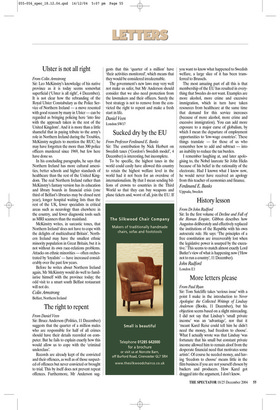Ulster is not all right
From Colin Armstrong
Sir: Leo McKinstry’s knowledge of his native province as it is today seems somewhat superficial (‘Ulster is all right’, 4 December). It is not clear how the rebranding of the Royal Ulster Constabulary as the Police Service of Northern Ireland — a move resented with good reason by many in Ulster — can be regarded as bringing policing here ‘into line with the approach taken in the rest of the United Kingdom’. And it is more than a little shameful that in paying tribute to the army’s role in Northern Ireland during the Troubles, McKinstry neglects to mention the RUC; he may have forgotten the more than 300 police officers murdered since 1969, but few here have done so.
In his concluding paragraphs, he says that Northern Ireland has more cultural amenities, better schools and higher standards of healthcare than the rest of the United Kingdom. The real Northern Ireland rather than McKinstry’s fantasy version has its education and library boards in financial crisis (one third of Belfast’s libraries may be closed next year), longer hospital waiting lists than the rest of the UK, fewer specialists in critical areas such as neurology than elsewhere in the country, and fewer diagnostic tools such as MRI scanners than the mainland.
McKinstry writes, in sarcastic tones, that Northern Ireland ‘does not have to cope with the delights of multicultural Britain’. Northern Ireland may have the smallest ethnic minority population in Great Britain, but it is not without its own race-relations problems. Attacks on ethnic minorities — often orchestrated by ‘loyalists’ — have increased considerably over the past few years.
Before he writes about Northern Ireland again, Mr McKinstry would do well to familiarise himself with the province today; the odd visit to a smart south Belfast restaurant will not do.
Colin Armstrong Belfast, Northern Ireland

















































































 Previous page
Previous page